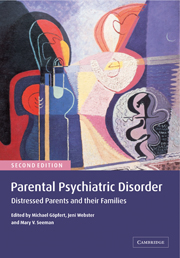Book contents
- Frontmatter
- Contents
- List of contributors
- Foreword
- Preface
- Part I Basic issues
- Part II Comprehensive assessment and treatment
- 6 ‘The same as they treat everybody else’
- 7 Formulation and assessment of parenting
- 8 Mentally ill mothers in the parenting role: clinical management and treatment
- 9 Perinatal mental illness: nature/nurture
- 10 Assessment and treatment issues when parents have personality disorders
- Part III Specific disorders: the impact on parent–child relationships
- Part IV Specific treatments and service needs
- Part V Child-sensitive therapeutic interventions
- Part VI Models for collaborative services and staff training
- Afterword
- Index
- References
7 - Formulation and assessment of parenting
from Part II - Comprehensive assessment and treatment
Published online by Cambridge University Press: 09 August 2009
- Frontmatter
- Contents
- List of contributors
- Foreword
- Preface
- Part I Basic issues
- Part II Comprehensive assessment and treatment
- 6 ‘The same as they treat everybody else’
- 7 Formulation and assessment of parenting
- 8 Mentally ill mothers in the parenting role: clinical management and treatment
- 9 Perinatal mental illness: nature/nurture
- 10 Assessment and treatment issues when parents have personality disorders
- Part III Specific disorders: the impact on parent–child relationships
- Part IV Specific treatments and service needs
- Part V Child-sensitive therapeutic interventions
- Part VI Models for collaborative services and staff training
- Afterword
- Index
- References
Summary
Introduction
This chapter presents a framework for assessing parents and their families for both forensic and clinical purposes, and is intended to help ensure that children receive the best care available. The chapter will (1) outline principles that contribute to ethical assessment practice; (2) provide dimensions to consider when making a formulation; (3) offer ideas about the preparation of court reports; and (4) describe practical ways of conducting collaborative and therapeutic assessments.
The three authors come from different backgrounds: family therapy/social work (JW), child psychiatry (JN) and adult psychiatry/psychotherapy (MG). Each of us is frequently asked to contribute to parenting assessments and we all three believe that combining perspectives results in the best product.
Depending on resources, philosophy, culture, and service construction, there are wide regional disparities in the conduct of assessments. There are few areas that can provide the thorough comprehensive assessment service pioneered by Jacobsen et al. (1997) (see Jacobsen, Chapter 8). In most situations, staff from different disciplines contribute to the overall assessment and child-care social workers have the responsibility of coordinating perspectives from different agencies and, ultimately, ensuring the safety of the child.
Principles of ethical assessment practice
Commitment to the parent
Although most of the literature in the field focuses on the needs of the child, the needs of the parent who cares for the child are of great importance.
- Type
- Chapter
- Information
- Parental Psychiatric DisorderDistressed Parents and their Families, pp. 93 - 111Publisher: Cambridge University PressPrint publication year: 2004
References
- 3
- Cited by

